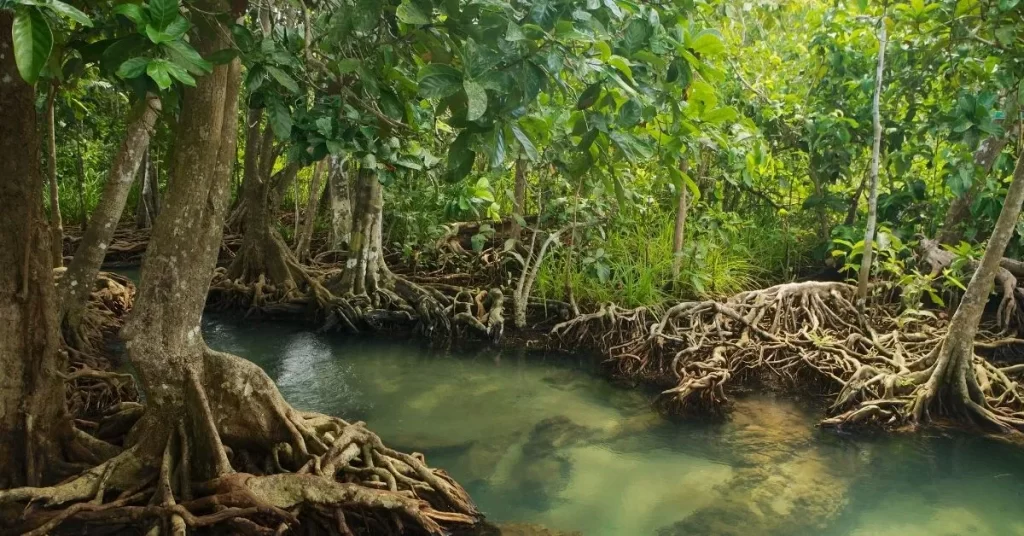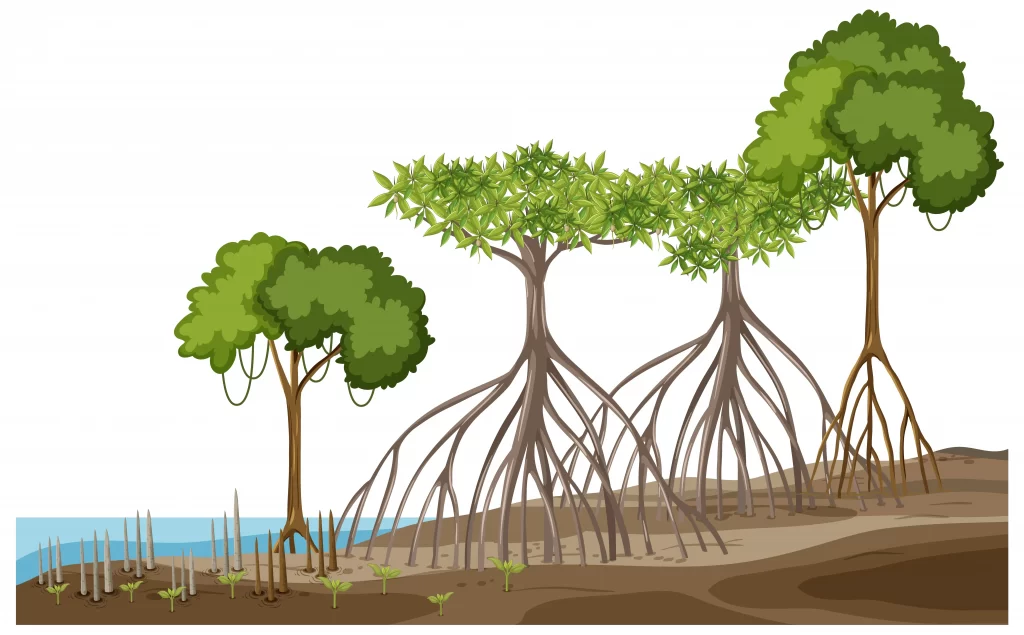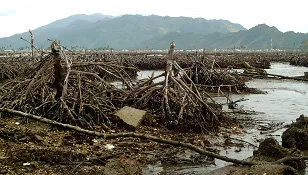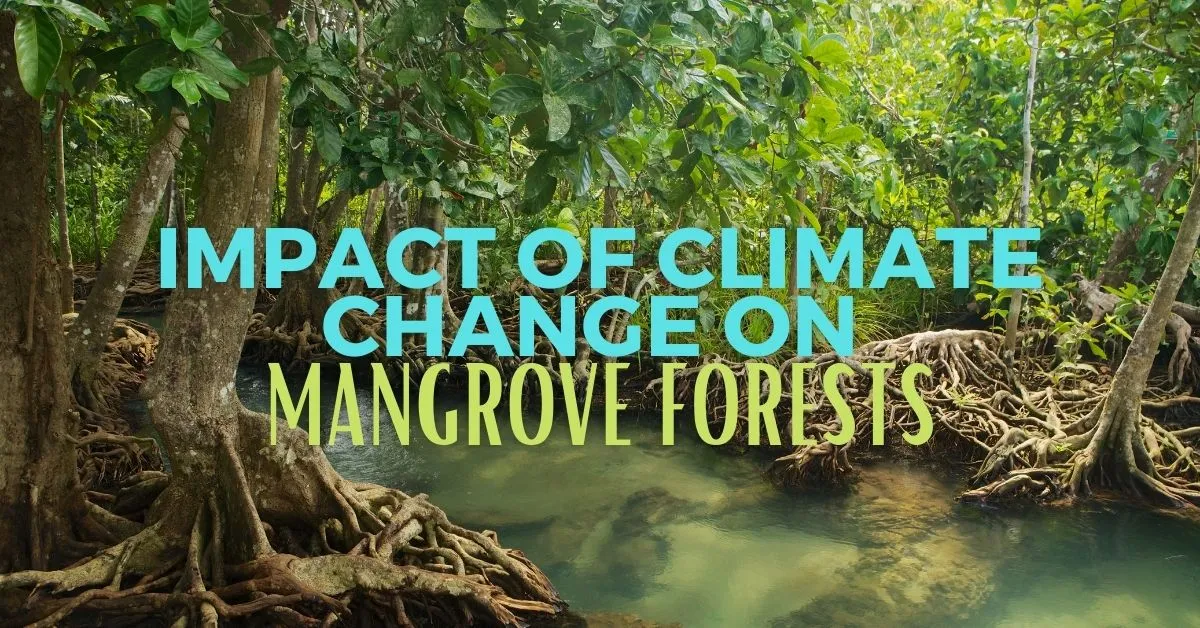Mangrove forests play a critical role in the coastal environment, and their health is essential for keeping our coastlines protected from storms and erosion. However, climate change is threatening these ecosystems, and research has shown that mangrove forests are disappearing at an alarming rate. In this post, we’ll take a closer look at the impact of climate change on mangrove forests, and we’ll explore some of the ways we can help to protect these vital ecosystems.

What are mangroves and why do they matter?
Mangroves are a type of tree that grows in saltwater marshes, coasts, and rivers. They are adapted to living in saltwater and often have tangled roots that help to anchor them in place.
Mangroves play an important role in protecting coastlines from erosion and storm damage. They also provide habitat for fish, crabs, and other animals. They are an important part of the ecosystem because they provide food and shelter for many animals, including fish, crabs, and shrimp.
Unfortunately, climate change is hurting mangrove forests. Rising sea levels and increased flooding are causing mangroves to die off at an alarming rate.
Read: Climate Change | 7 Alarming Effects and the Major Causes Behind
It is important to protect mangroves because they play a vital role in our ecosystem. They provide a home for many animals and help to protect our coastlines. We must take action to reduce the impact of climate change on these important trees.
Mangrove forests are an important natural barrier against cyclones, tsunamis, and storm surges. They help to protect coastlines from these destructive forces by absorbing the energy of waves and wind, and by dissipating the force of the water as it flows through the trees.
Read: The Reality of Rising Sea Levels and How It Affects Us
The roots of mangrove trees are also strong enough to resist the powerful currents that often accompany these storm events. In addition, mangrove forests provide a natural habitat for fish, crabs, and other marine life. This diversity helps to create a balanced ecosystem that is better able to withstand the impact of severe weather.
They can be used as fuelwood which is necessary for many parts of the world where there’s not enough land available. They also act like sponges by absorbing nutrients that would otherwise end up cycles choking out plants elsewhere on Earth!

Mangrove forests store large amounts of carbon dioxide (CO2), acting environmentally friendly compared with other methods such as decommissioning fossil fuels today.
The importance these trees play cannot always go unnoticed – One way we’re thankful for them comes through their use when creating medicine: traditional medicines often come directly from researching what types grow around certain areas so people will know how best to treat illnesses.
Read: When Fossil Fuel Will Run Out? Can Fossil Fuels be Renewed?
The impact of climate change on mangrove forests:
Mangrove forests are among the most diverse and productive ecosystems on Earth. However, mangroves are under threat from several environmental stressors, including climate change. Rising sea levels, increased storm intensity, and changes in precipitation patterns are all expected to have devastating impacts on mangrove forests in the coming years.
As a result of these changes, many mangrove species are already facing extinction. In addition to the loss of biodiversity, the destruction of mangroves also has several other negative consequences. For example, mangroves help to protect coastlines from erosion and storm damage. Without them, coastal communities will become increasingly vulnerable to flooding and other natural disasters.

The destruction of mangroves also hurts local economies that depend on them for fisheries and timber. Mangrove conservation is therefore essential not only for the health of our planet but also for the wellbeing of its people.
Man-made global warming is causing the oceans to expand, leading in turn to rising sea levels. The rate at which they’re expanding varies depending on factors like temperature differences between water areas and ice sheets that weigh them down; however, this isn’t an evenly spread problem since some parts of coastal environments will be flooded more than others due simply because we live there!
Mangroves are experts when it comes time for adapting or changing their environment–they’ve had plenty of experience with both waxing and waning cycles over long periods during geological ages ago while now humans need only wait patiently until these changes happen again before recognizing what needs adjusting (or not) within our own lives.
Read: Global Warming | The Shocking Future of Our Planet
How can we protect mangrove forests from climate change?
Mangrove forests are valuable natural resources that protect the environment. But climate change is a great threat to it. As a result, we must take action to protect these valuable ecosystems. One way to do this is to plant native species of mangroves in areas where they are likely to be impacted by climate change.
Another strategy is to create artificial reef systems near mangrove forests to help reduce the impact of waves and storms. By taking steps to protect mangrove forests, we can help ensure the long-term health of our coasts and oceans.
Mangrove forests play an important role in protecting coastlines from the damaging effects of storms and erosion; they also provide critical habitat for a variety of fish, crustaceans, and other marine life. However, mangrove forests are under threat from climate.
Read: How Negatively Climate Change Affects the Fate of the Amazon Forests?
Mangroves in the future:
The loss of mangroves will have far-reaching consequences for both people and the environment. It is estimated that we have lost over 50% of the world’s mangroves in the last 50 years. If we don’t take action to protect these important ecosystems, the consequences will be devastating.
Mangrove conservation is therefore essential for the future of our planet. There are several ways to do this, including planting new mangrove trees, restoring damaged mangrove forests, and creating protected areas. It is a daunting task, but one that we must not delay. The future of our planet depends on it.
Conclusion:
Although the impact of climate change on mangrove forests is daunting, there are ways we can help. Mangroves provide several important ecosystem services, including coastal protection, fisheries production, and carbon sequestration. If we act now to protect these valuable resources, we can make sure they continue to benefit people and nature for years to come. What solutions do you think should be implemented to best protect mangrove forests?


It was great seeing how much work you put into it. Even though the design is nice and the writing is stylish, you seem to be having trouble with it. I think you should really try sending the next article. I’ll definitely be back for more of the same if you protect this hike.
Thank you for taking the time to provide your feedback and for recognizing the effort put into the work. It’s great to hear that you appreciate the design and style of the writing. Your constructive comments are also valuable, as they help in understanding areas that might need improvement or a different approach.
I’m continuously striving to enhance the quality of the content and the overall experience for readers like you. Your suggestion to focus on the next article is well-received, and I’ll certainly take it into consideration as I plan future content.
I’m looking forward to having you back for more articles, and I’m committed to maintaining and improving the standard of the content. If you have any specific suggestions or topics you’d like to see covered, please feel free to share. Your input is crucial in shaping the direction of our content. Thanks again for your support and insightful comments! 🌟📚🙏